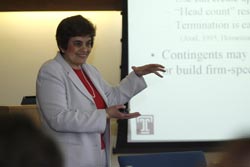Graduate student might be older than most, but she’s already published
Doctor of philosophy: organization and human resource management
 Photo by Ryan S. Brandenberg/Temple University
Lisa Stickney presents her research about the correlation between business
performance and the hiring of highly skilled contingent workers during her Ph.D. defense. |
At times, Lisa Stickney, a 47-year-old business Ph.D. student, literally had to traipse through miles of snow to get Temple, all part of her commute from the Poconos to Temple for the past 5 1/2 years. But that obstacle, and the fact that she is one of the oldest students in the program, didn’t stop her from pursuing her doctorate.
“I live in an area with a lot of miniature golf courses and water parks, but a shortage of Ph.D. programs,” she said. “Everything was going to be a two hour ride, and with Temple, I knew I’d at least be driving away from the ice.” Stickney is bubbly and energetic, and loves to crack jokes and rattle off bite-sized educational facts. She seems like a born teacher. But despite her willingness to spend countless hours on the highway to obtain a Ph.D., Stickney was initially uninterested in the world of research papers and professors. |
|
“My father was an academic and I swore I would never do that to my children,” she said. Stickney’s attitude changed after she earned a bachelor’s degree in economics and a master’s degree in management science, and decided to teach nights at the Northampton Community College to get herself out of the house. At the time, her son was 18 months old son. From the first moment she stood in front of a classroom, she said, she knew that she had found her niche. Eight years later, after working as a professor at Northampton Community College and East Stroudsburg University, Stickney decided to return to school for her Ph.D. She craved a higher position in academia, but needed a doctorate to progress. The prospect of crafting a lengthy research paper for her doctorate was almost an added attraction. “I’ve always loved to read as much I can,” she said. “At work, I mentioned articles I read so often, people dubbed me “Lisa ‘I read an article’ Stickney.” Stickney decided to study organization and human resource management because it corresponded with her interests in business and psychology. She chose three points of focus: contingent workers, gender-role attitudes and earnings, and workplace emotions. In her research published in Sex Roles, she found that women with egalitarian attitudes are more successful in their careers than traditionally minded women, despite their educational or job experience. In separate research, she also determined that businesses that hire many highly skilled contingent workers have a higher rate of performance, but ones that hire a few highly skilled contingent workers have a lower rate. In yet a third research project, she also discovered that anger could be a beneficial emotion in the workplace — because the people who are more dedicated to the business are the same people who become angry.
While enrolled in the program here at Temple, she has worked as a teaching assistant for several sections of an organization and management course, in which approximately 275 students were enrolled. In addition, for the past 3 1/2 years, she has been teaching at the McGowan School of Business at King’s College in Wilkes-Barre, Pa. In the fall, she will begin working at the University of Baltimore as an assistant professor in the department of management and marketing. – By Holly Otterbein |
|